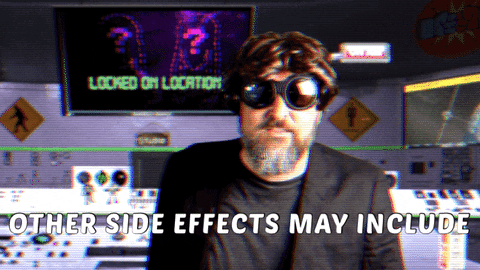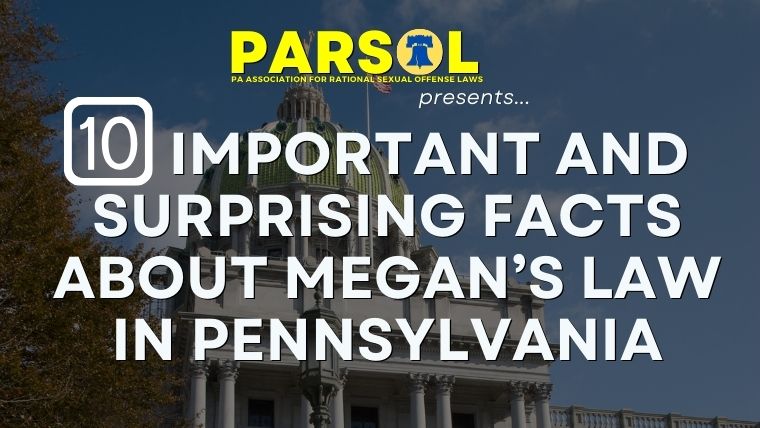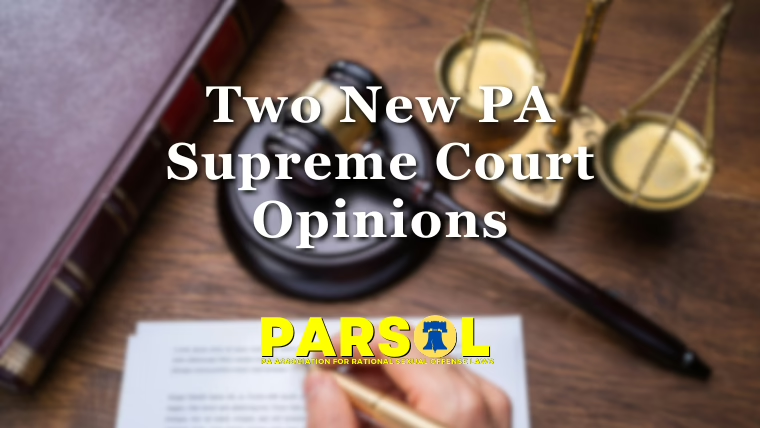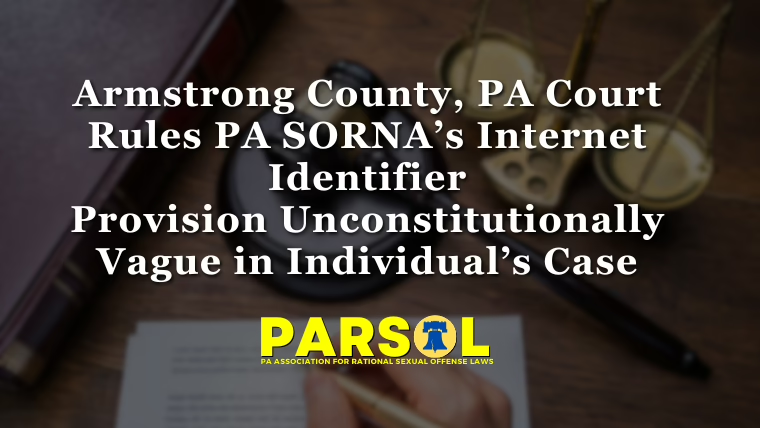We know that many myths and misinformation exist about PA Megan’s Law. Plus, the language in the law can be confusing. Therefore, the Pennsylvania Association for Rational Sexual Offense Laws (PARSOL) has assembled this list of ten things you should know about Megan’s Law in Pennsylvania.

1. Megan’s Law is PA’s version of SORNA

After the courts ruled PA’s version of Megan’s Law Unconstitutional two times, Pennsylvania modeled its sex offense registry after guidelines from a federal law called SORNA (Sex Offender Registration and Notification Act). Pennsylvania began tracking and publishing information about people with sex offenses on their records in 1996. Since then, the PA Megan’s Law has grown to include over 22,000 PA residents. The PA Legislature initially enacted Pennsylvania’s version in 1995, which amended the law several times. The law requires the Pennsylvania State Police to maintain a registry of adult and juvenile sex offenders convicted of certain offenses.
2. There are no residency restrictions in Megan’s Law

The 2011 PA Supreme Court case of Fross v. County of Allegheny 20 A.3d 1193 (Pa. 2011) ruled that Allegheny County could not pass a 2500-foot residency restriction ordinance. They led that such a law would counter the PA’s stated objective of facilitating reentry to people who have completed their sentences. While a few lawmakers in Harrisburg continue to propose bills that would create residency restrictions, no laws like the one struck down have passed.
3. There are 2+ Megan’s Law registries in PA

There are two separate registries under PA Megan’s Law.
Subchapter H is for people who committed crimes on or after Dec. 20, 2012, and follows federal standards. This subchapter is tier-based with 15-year, 25-year, and lifetime registration requirements. In addition, those deemed sexually violent predators are subject to lifetime registration with monthly mandatory counseling.
Subchapter I is for people who committed crimes before Dec. 20, 2012. with another less restrictive set of rules with 10-year, lifetime, and SVP classification tiers.
In addition, Pennsylvania frequently adds Megan’s Law registrants to a third non-SORNA registry: Pennsylvania’s Childline Registry. Childline is a non-public registry for employment and volunteer screening for organizations serving children.
4. Registrant’s crime may not have included children.

At the federal level, Megan’s Law requires persons convicted of sex crimes against children to notify local law enforcement of any change of address or employment after release from custody. Still, in Pennsylvania, this is not the only case. Not everyone on the sex offender registry has a crime against a child. Having a conviction of any of the following offenses can get you on the Megan’s Law list:
- 18 Pa.C.S. § 2902(b) (relating to unlawful restraint).
- 18 Pa.C.S. § 2903(b) (relating to false imprisonment)
- 18 Pa.C.S. § 2904 (relating to interference with custody of children).
5. Anyone in the world can access the Megan’s Law registry.

According to advocates, Megan’s Law was meant to protect families and neighbors, but in today’s digital world, anyone can access any state’s registry and browse intimate details of people’s lives. In addition, because the list includes registrants’ home addresses, this puts persons forced to register at risk of global vigilantes. Frequently, people search for “Pennsylvania Sex Offenders Near Me” and use the information on the registry to harass or scam people.
6. Pennsylvania’s Megan’s Law has been ruled Unconstitutional several times.

The current version of Megan’s Law was signed into law in 2018 after the case of Muniz, where the Court found that the previous registration process was invasive enough to be considered punishment.
The Supreme Court heard the case of Torsilieri v Commonwealth of PA in 2019. It was sent back to a lower court so that the Commonwealth of PA can prove to the Judges that all 22,000+ people on the sex offense registry are high risk and deserve to be on a publicly available registry accessible to anyone in the world. However, on Aug. 24, 2022, a Chester County judge ruled that the Commonwealth failed to prove its case. The judge called PA Megan’s Law overbroad, cruel, unusual, and unconstitutional. Unfortunately, in May 2024 after a year of deliberations, the Supreme Court of Pennsylvania reversed the Chester County decision.
The Supreme Court of Pennsylvania has compelled the Pennsylvania General Assembly to rewrite the registry law in Pennsylvania five times.
7. Megan’s Law can cause recidivism due to multiple reasons

Advocates of the Sex Offender Registration and Notification Act (aka Megan’s Law) claim the law reduces recidivism, but the opposite may be true for several reasons:
- Sex continues to be a taboo subject in our society and culture and carries shame, stigma, and judgment.
- SORNA registrants struggle with finding insurance-providing jobs, so they use taxpayer-funded, subsidized coverage. Unfortunately, this coverage often does not cover mental needed mental health services. Registrants need providers trained in trauma, compulsive sexual behaviors, and other paraphilias (atypical sexual issues).
- Many landlords and housing authorities won’t rent to “sex offenders,” so registrants are forced to live wherever they can find a place. As a result, many become homeless and must register every time they “move” to a new location.
This unmanaged stress and disruption can lead a registrant to return to their old destructive ways or decide life can only be better in prison.
8. Collateral consequences overflow into families

Being on the PA Megan’s Law list can keep a person forced to register from getting a stable job, finding housing, pursuing education, and having equal access to physical, mental, and emotional wellness resources and healthcare. The associated stigma can create stifling barriers with friends and family members. These barriers create a tremendous burden on the registrant’s family. Children of persons on the registry are bullied in school and have trouble establishing healthy friendships.
9. Advocacy groups (like PARSOL) are trying to replace it with prevention

It has become clear that PA’s Megan’s Law is too broad and has more of a damaging effect on society than a protective effect. PARSOL and national groups like United Voices for Sex Offense Reform, Women Against the Registry, and NARSOL provide resources to people affected by irrational sex offense laws. They also advocate and educate lawmakers and the general public to try to shift resources away from the ineffective public sex offense registry and toward best practices to prevent sex offenses before they ever happen.
10. It just doesn’t work.

As we’ve demonstrated in the above areas, SORNA doesn’t work. So despite what advocates claim, we have to say: No, you’re wrong.
- No, it’s not a deterrent. Sex offense arrests, including downloading illegal images of children, have increased, despite the threat of long prison terms and Megan’s Law registration.
- No, It’s not protecting from recidivism. First-time offenders commit most sex crimes, and recidivism rates among those on the sex offense registry are low.
- No, It’s not fair. Very few people thoroughly evaluated to determine how much risk they present to the public.
- No, It’s inflexible. This one-size fits all approach turns The List into a guessing game and ruins the reputation of the people listed on it.
So, there you have it – our top ten things you need to know about PA Megan’s Law (SORNA). Don’t hesitate to get in touch with us if we missed anything or if you have a question or comment.





I’m maxed out of prison but my therapist says I must submit to polygraphs, is this true?
It is possible that a condition imposed by the court, parole, or probation is that you successfully complete “offender treatment and comply with the conditions set by the treatment professional.” This is not a Megan’s Law requirement, but likely a court-imposed condition.
The treatment provider can discharge you from group for refusing to submit to a polygraph. Probation or parole can violate you for violating the special condition failure to successfully complete treatment if you’re on supervision and have this special condition. Those who are mandated to go to monthly counseling because of SVP status can also be discharged but would have 30 days to find another treatment provider.
PA has indiscriminately placed individuals on the registry even if their offense occurred in the 1980’s. It does not matter that an employer does ask about prior bad acts. If they find your name on the registry, they will not hire you. They won’t say it’s the registry, but I’ll say it is. I have had many very positive interviews, only to have the background check kill any chance. The actual offense does not show even show up. Mine is over 33 years ago.